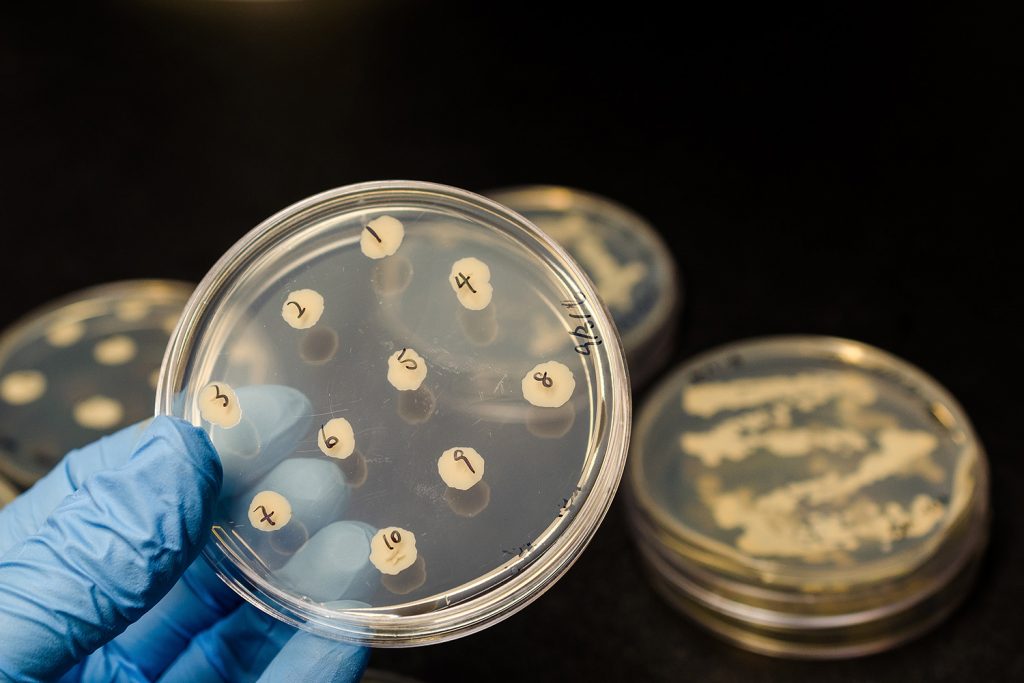09 Mar Can bacteria develop resistance to plant extracts?

In 1928, Sir Alexander Fleming discovered an antibiotic substance that he named “penicillin”, produced by molds of the genus Penicillium. With this discovery, the golden era of antibiotics began, saving thousands of human lives. However, Sir Fleming himself predicted in 1948 that the overuse of penicillin could lead to the selection and propagation of resistant bacteria, and in 1955 widespread bacterial resistance to penicillin had already developed.
In the recent decades, the problem of antibiotic resistance is worsening fast, due to the misuse of antibiotics in human beings and in farm animals, and to the fact that it is difficult for the pharmaceutical industry to market new antibiotics. It is estimated that 1.2 million people worldwide die of antibiotic resistance every year.
Antibiotic resistance is a question of natural selection
Bacteria are among the fastest reproducing organisms in the world. They can double their number in a period ranging from 4 minutes to 24 hours.
Every time bacteria duplicate, they need to make two identical copies of their DNA, and there is a chance that errors (mutations) occur. Some mutations are harmful to bacteria, while others can provide an advantage, allowing the mutated bacteria to grow faster than their neighbors. This process is called natural selection.
The mutated gene that provides an advantage is transferred to the bacteria’s progeny during replication, and can also be transferred to other bacteria from the same or from a different species through a process called conjugation.
Antibiotic resistance is a type of mutation that gives bacteria a defense mechanism against antibiotics. There are different types of defense mechanisms, including preventing the entrance of the antibiotic into the bacterial cell, destroying the antibiotic, modifying the target molecule, etc.
As the mechanisms of action of antibiotics are highly specific, resistance is fairly easy to appear.
The complexity of plant extracts is an advantage
Bacteria cannot develop resistance to plant extracts for two main reasons:
- Plant extracts have a complex chemical composition. For example, an essential oil may contain over 300 different constituents, some of them with synergistic activities. Developing bacterial resistance to such complex mixtures of active compounds is much slower than to a single chemical compound (antibiotic)
- Antibiotics have a specific mechanism of action. Conversely, constituents of plant extracts kill bacteria through multiple mechanisms of action. In this article, we explained the complex operating mechanisms of plant extracts as antibacterials, which include inhibition of quorum sensing and direct effects on the bacterial cell. Such complexity makes the development of resistance improbable.
Multiple investigations confirm that it is highly unlikely that bacteria develop resistance to plant extracts. However, it should be pointed out that some reports suggest that occasionally bacteria can become resistant to single phytochemicals. In example, Ait-Ouazzou et al. (2013) described a case of Listeria monocytogenes developing resistance to carvacrol. To avoid this problem, it is necessary to formulate products based on whole plant extracts, or else with combinations of several phytochemicals.
Products of choice
GrowthPlus© is added to feed to maintain and improve digestive health. It is formulated with synergistic ingredients:
- Bactericidal and fungicidal plant extracts, combined with organic acids for better effectiveness, that reduce the number of pathogenic microbes in the digestive system.
- Plant extracts with prebiotic effect, that promote the growth of beneficial bacteria in the gut.
- Immunostimulant and antioxidant plant extracts.
- Silicates with mycotoxin binding function.
It is especially useful in cases of gizzard diseases, necrotic enteritis, feed passage and other enteritis. It is also used as a natural growth promoter and to replace antibiotic growth promoters.
ReproPlus© is a premix powder intended to maintain and improve digestive health in pregnant and lactating sows. It is formulated with synergistic ingredients:
- Bactericidal and fungicidal phytogenics, combined with organic acids.
- Phytogenics with immune boosting and antioxidant activity.
- Plant extracts with prebiotic effect.
- Vegetable oils rich in omega 3.
- Silicates with mycotoxin binding function.
When administered during the last period of gestation, it has a positive impact on the survivability and the health of the litter.
PigletPlus© is intended to maintain and improve digestive health. It is formulated with synergistic ingredients:
- Bactericidal and fungicidal plant extracts, combined with organic acids for better effectiveness, that reduce the number of pathogenic microbes in the digestive system.
- Plant extracts with prebiotic effect, that promote the growth of beneficial bacteria in the gut.
- Immunostimulant and antioxidant plant extracts.
- Silicates with mycotoxin binding function.
It is especially useful in cases of bacterial diarrhea during the suckling and post weaning period, and to promote growth in all ages.
AroMar©, highly concentrated premix powder that contains phytogenics and organic acids, to be added to aquaculture feeds.
Do not miss any of our articles!
Subscribe to our monthly newsletter

Certain health statements may not be applicable in your region.

